|
|
|
Sort Order |
|
|
|
Items / Page
|
|
|
|
|
|
|
| Srl | Item |
| 1 |
ID:
087986
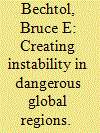

|
|
|
|
|
| Publication |
2009.
|
| Summary/Abstract |
North Korea contributes to instability in the Middle East and South Asia through its proliferation of missiles and other weapons systems used as delivery platforms for chemical (and the production of chemical munitions) or biological weapons, including long-range artillery. Evidence also shows that North Korea has collaborated in the nuclear programs of Syria, Iran, Libya, and Pakistan and has provided weapons and training to terrorist groups in both the Middle East and South Asia (Hezbollah and the Tamil Tigers). Given the recent decision by Washington to take Pyongyang off of the list of State Sponsors of Terrorism, the recent and ongoing activity by North Korea directly related to proliferation of WMD and the support of terrorist groups could lead to severe foreign policy challenges for the United States and its allies in the future.
|
|
|
|
|
|
|
|
|
|
|
|
|
|
|
|
| 2 |
ID:
092338
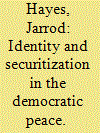

|
|
|
|
|
| Publication |
2009.
|
| Summary/Abstract |
While almost a decade old, Ted Hopf's observation that the democratic peace is an observation in search of a theory still holds validity. In particular, the mechanisms behind the democratic peace are poorly understood, making it difficult for scholars to provide a compelling explanation. Underappreciated in the existing work is the role of identity and the importance this has for driving the democratic peace. With a focus on developing a dyadic democratic peace mechanism and using a case study approach, this paper utilizes the Copenhagen School's securitization framework to examine how identity plays out in the US response to the Indian and Iranian nuclear programs. It finds that in fact identity does play an important role in how security policy is constructed. In policy terms, if the democratic peace does rely on identity to trigger the constraining norms that limit the escalation of conflict to violence, it is unlikely the democratic peace can be spread by force and it is possible that states nominally democratic can be excluded from the community of democracies if their behavior or significant other aspects of their perceived identity are at variance with the accepted democratic identity standard.
|
|
|
|
|
|
|
|
|
|
|
|
|
|
|
|
| 3 |
ID:
094513
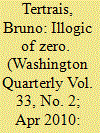

|
|
|
| 4 |
ID:
125616
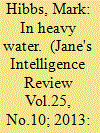

|
|
|
|
|
| Publication |
2013.
|
| Summary/Abstract |
After 10 years of design procurement, and construction, Iran's new heavy water reactor in Arak is nearing completion. Mark Hibbs explains why the project is a growing concern for those monitoring Iran's nuclear capabilities.
|
|
|
|
|
|
|
|
|
|
|
|
|
|
|
|
| 5 |
ID:
130360
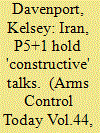

|
|
|
|
|
| Publication |
2014.
|
| Summary/Abstract |
Iran and six world powers held "constructive and useful" talks on a comprehensive deal on Iran's nuclear program, according to a March 19 joint statement released by the parties. A main topic of the talks between Iran and the six-country group, known as the P5+1 (China, France, Germany, Russia, the United Kingdom, and the United States), was Iran's uranium-enrichment program. The March 17-19 talks in Vienna were the second set of meetings between Iran and the P5+1 on a comprehensive deal on Iran's nuclear program after the parties reached an interim agreement in November. Implementation of the initial actions began Jan. 20 and is to last six months. If an agreement is not reached, the interim deal can be extended by mutual consent of the two sides. U.S. officials have said they hope to reach a final deal within the first six months. Iran maintains that its nuclear program is for peaceful purposes, but some countries are concerned that Iran could use its nuclear capabilities to develop nuclear weapons.
|
|
|
|
|
|
|
|
|
|
|
|
|
|
|
|
| 6 |
ID:
087043


|
|
|
|
|
| Publication |
2009.
|
| Summary/Abstract |
Indonesia, Thailand, and Vietnam recently announced that they are launching nuclear energy programs, and Malaysia and the Philippines soon may follow suit. As a result, by 2020, at least three states in Southeast Asia could possess latent nuclear capabilities-the option to pursue military applications of dual-use nuclear technology. Analysis of the nuclear programs, domestic proliferation pressures, and the external threat environment in Southeast Asia leads the authors to conclude that the nuclear intentions of states in that region are entirely peaceful and the probability of future nuclear breakout there is low. However, this finding does not justify complacency. In the long term, the benign outlook for regional security may change, and in the near term weak regulatory regimes present serious challenges to nuclear safety and create opportunities that non-state actors may exploit. To minimize these risks, the authors recommend creating a "proliferation firewall" around the region, which would combine strong global support for Southeast Asian nuclear energy programs with innovative regional multilateral nuclear arrangements.
|
|
|
|
|
|
|
|
|
|
|
|
|
|
|
|
| 7 |
ID:
167084


|
|
|
|
|
| Summary/Abstract |
When intelligence agencies assess whether a state is pursuing nuclear weapons, how much evidence is enough? I argue that intelligence agencies adopt different standards for rendering definitive judgments in such situations. This, in turn, pushes them toward different kinds of mistakes. Urgent judges reach definitive conclusions about the existence of secret nuclear weapons programs more quickly and with less evidence than their peers. They risk seeing ambitious nuclear schemes where none exist. Skeptical judges wait longer and accumulate more proof before reaching definitive conclusions. They risk erring in the direction of underestimation. Where existing work focuses on intelligence accuracy, I show that variation in judgment is a distinct and important dimension of performance. What, then, drives judgment? I test an explanation based on the dynamic influence of previous intelligence failure. I observe that the judgment of intelligence agencies in two states, the United States and Israel, was differentially affected by failure as they tracked potential nuclear proliferation by Libya and Syria. These controlled comparisons constitute a novel approach to the study of nuclear intelligence performance. I find significant support for my explanation. Fearing repeat failure, intelligence agencies alter their efforts and standards of proof in an area critical to statecraft.
|
|
|
|
|
|
|
|
|
|
|
|
|
|
|
|
| 8 |
ID:
123107
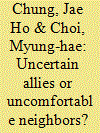

|
|
|
|
|
| Publication |
2013.
|
| Summary/Abstract |
This study is based upon two premises: (1) the available literature, though voluminous, fails to provide systematic understandings of the complex and evolving relations between China and North Korea; and (2) China and North Korea had been short of being trusted allies bound in blood and belief even before the launch of post-Mao reforms and the normalization of Beijing-Seoul relations. This article dissects this curious relationship into four questions: (1) What does history inform us about China's relations with (North) Korea? (2) Has China communicated effectively with North Korea? (3) Have China and North Korea been 'trusted allies'? (4) How effective has China been in inducing North Korea to comply with its demands over the years? The authors argue that, geo-strategically, China can hardly afford to put North Korea in an adversarial position. Furthermore, residues of the Factional Incident of 1956 and North Korea's deep-rooted suspicion of China still linger on. These have been the sources of Beijing's dilemma in consistently opting for 'soft' measures despite that North Korea's provocative acts and nuclear weapons programs have negatively affected China's interests. From the outset, China and North Korea had been more uncertain allies who had to cooperate with each other under the ideological and geopolitical imperatives of the difficult times. The authors also suggest that it would be misleading to put Sino-North Korean dynamics in a usual category of big power-small nation relations where power asymmetry generally works against the latter. North Korea has undoubtedly been an atypical 'small nation'. It is due to these limitations that China's pressurizing has not been always effective and that Beijing's reactions have been continuously cyclical. This cyclical trend is not likely to be broken since the upcoming drama of Sino-American rivalry is bound to close the window of such opportunities for China, which will nevertheless regard North Korea increasingly as a liability, if not uncomfortable neighbor.
|
|
|
|
|
|
|
|
|
|
|
|
|
|
|
|
|
|
|
|
|